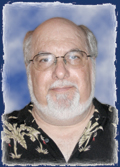

Science Fiction or Science Fact?
Cue the deep announcer voice: How powerful is the gravity on Krypton? Do mutants exist? Can Superman travel faster than a speeding bullet? What is a gamma bomb? The answers to these intriguing questions and more lie in the pages penned by author Robert Weinberg, MS’70 (T).
Weinberg, along with collaborator Lois Gresh, is the author of The Science of Superheroes, a book that seeks to answer the question of hard-core comic book fans everywhere: Is it science fiction or science fact? Weinberg, with his background in mathematics, and Gresh, a computer scientist, have unique insights into the science fiction genre. “Many people learn science from comic books,” Weinberg says, “and comic books are not written by scientists. But, surprisingly, many of the scenarios in comic books are within the realm of possibility.”
Those possibilities are described in Weinberg’s books. For fans waiting anxiously for the answers to the questions above, the gravity of Krypton is 1,000 times the gravity of Earth. Mutants exist all through the animal kingdom. Superman can fly faster than a speeding bullet. A speeding bullet travels about three-quarters of a mile per second. That is 45 miles per minute or 2,700 miles per hour. Some airplanes can fly that fast. And, finally, any atomic bomb can be called a gamma bomb. Gamma rays are extremely high energy waves emitted by radioactive substances like Uranium-235. Gamma rays are emitted when a nuclear explosion takes place.
Weinberg began writing while still in college — “I sold my first science-fiction story in 1967” — and has not stopped since. He is the author of more than 32 novels and nonfiction books, including The Science of Supervillains and the “Masquerade of the Red Death” vampire trilogy: Bloodwar, Unholy Allies and The Unbeholden.
Early in his career, he and his wife, Phyllis, owned a bookstore along with a mail-order business. “I wrote nonfiction, horror and sci-fi novels while running the bookstore. Fortunately, I knew enough people who gave me good advice, and I was able to find a good agent.”
| “When the creativity and energy are flowing … I have absolutely no concept of the passing of time.” |
|---|
One of the people Weinberg counts as friend, teacher and role model, is bestselling novelist Dean Koontz, who wrote the introduction to Superheroes. “When I started writing, Dean advised me to keep my focus on my characters and never step out of that point of view. That is some of the best writing advice I was given.”
About 15 years ago, Weinberg decided to dedicate more of his time to writing. “I have become totally absorbed in my writing and keep crazy ‘writer’s hours.’ When the creativity and energy are flowing, I write from early evening well into the early morning hours of the next day; I have absolutely no concept of the passing of time,” he wryly explains.
Raised in Hillside, N.J., Weinberg’s undergraduate degree in mathematics from the Stevens Institute of Technology afforded him many job offers; but, he says, he didn’t want a “traditional job.” So, Weinberg applied for the master’s program in mathematics with an honors fellowship at Fairleigh Dickinson. “I had a friend from high school who attended FDU, I knew the area, and I loved its proximity to New York City.”
The fit was ideal for Weinberg. He “taught as a teacher’s assistant in the morning and attended classes in the evenings. It was a very enjoyable period of my life.” Weinberg liked teaching, describing it as “very similar to writing. My time at FDU was the best of both worlds, with the challenge of the academics and the passion for a job.”
Weinberg now resides in Chicago, Ill., where he is always in the middle of either writing or researching his next subject. Married 32 years, he is the father of one son, Matthew, of whom he boasts, “He’s such an intelligent young man. He designs computer games, and I am happy that he has accomplished so much in his own life.”
Weinberg is awaiting the publication of yet another book, The Science of James Bond, in April 2006. Also co-authored with Gresh, the book debunks many of the inaccuracies in the famous Bond series. “Many of the plots are simply not logical; but we have a great time discussing them.”
And, fans can look forward to many more interesting books and projects. Currently, Weinberg is exploring television deals for The Science of Superheroes, and there is always an idea for another book brewing. “It’s hard for me to imagine a better career.”
— M.D.
FDU Magazine Home | Table of Contents | FDU Home | Alumni Home | Comments
©Copyright 2006 Fairleigh Dickinson University. All rights reserved.
For a print copy of FDU Magazine, featuring this and other stories, contact Rebecca Maxon, editor,
201-692-7024 or maxon@fdu.edu.